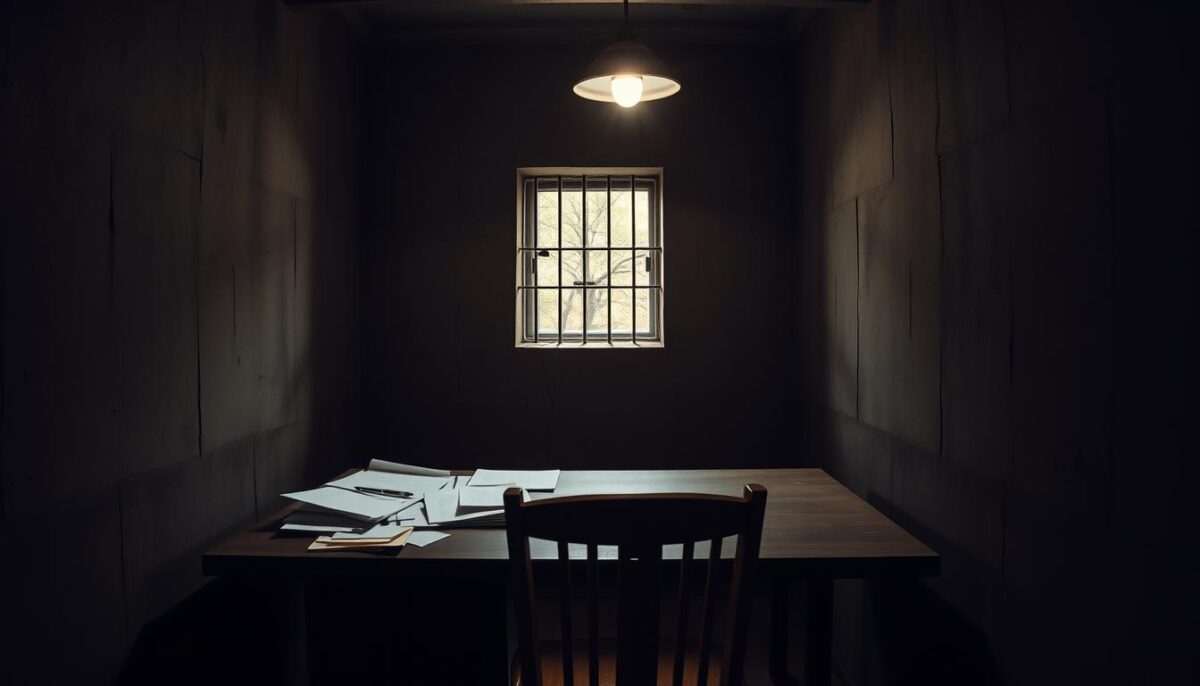Ending a marriage while in prison in Indiana can be tough. But you’re not alone. Many people go through this process. The good news is that Indiana allows divorces even if one spouse is in prison.
Understanding the steps to get a divorce in prison is key. It might seem complicated, but we’re here to help. We’ll guide you through the process, from serving papers to knowing your rights.
Understanding the Divorce Process for Incarcerated Individuals
The divorce process for inmates is filled with challenges. Being in jail makes it hard to communicate and access legal help. It’s key to know the steps involved in a prisoner’s divorce.
Emotions play a big role in this decision. Legal rules also need careful attention. These rules can affect how the divorce is handled.
In some places, like Virginia, a prisoner might be seen as having a “disability” in divorce. This can change how the case is managed. It might also mean a Guardian ad litem (GAL) is appointed to look out for the prisoner’s interests.
Finances are another big issue. Usually, the spouse not in jail pays for the GAL. But, in some cases, the state might cover this cost. Knowing this can help understand how the divorce will go.
Being apart for a long time can be a reason for divorce. For example, a felony conviction can affect how assets are split and support is decided. Courts also consider the current financial situation of both spouses.
| State | Duration of Incarceration for Fault-Based Divorce | GAL Coverage |
|---|---|---|
| Virginia | Felony conviction, over one year | Typically covered by non-incarcerated spouse |
| New York | Three or more consecutive years | Non-incarcerated spouse pays unless specified |
| Texas | At least one year | Non-incarcerated spouse typically pays |
| California | No specific requirement, but generally long-term imprisonment applies | Paid by non-incarcerated spouse under normal circumstances |
Knowing these details can help a lot in the divorce process for inmates. It’s important to plan for communication issues and legal help. This process, though tough, can lead to a fresh start.
Incarceration as Grounds for Divorce
Understanding incarceration as grounds for divorce is key for those dealing with divorce while in prison. In Indiana, divorce can be both no-fault and fault-based. Some states allow divorce if a spouse is in prison for a long time due to their actions.
In New York, being in prison for three years or more is a fault-based reason for divorce. Texas also allows divorce if a spouse is in prison for a year or more for a felony. But, each state has its own rules about how long someone must be in prison before they can file for divorce.
Legal issues go beyond just getting a divorce. Courts look at things like if the person in prison can pay support. They also consider how being in prison affects child custody. Courts usually put the child’s needs first when deciding custody.
Remember, the debate on no-fault divorce shows how it affects families, especially when one partner is in prison. States like Maryland, New Jersey, and Pennsylvania also allow divorce due to imprisonment. Knowing this can help make better choices.
How to Get Divorce in Prison Indiana
Getting a divorce while in prison is complex. Knowing the basic steps helps me feel more confident. The first step is figuring out why I want a divorce and preparing the needed legal papers.
Initial Steps to Take
First, I need to think about why I want a divorce. Reasons like emotional struggles in prison or trust issues are common. I must collect all important details, like my spouse’s prison info and our past talks. This prep work makes the divorce filings by incarcerated individuals smoother.
Legal Forms Required
Getting the right legal forms for prison divorce is key. A divorce petition is usually the main form. I might also need papers for custody or splitting assets. Knowing these forms well makes filing easier. For more help, I can look at instructions on how to get a divorce in prison.
| Form Type | Description |
|---|---|
| Divorce Petition | Primary document initiating the divorce process. |
| Custody Agreement | Used if children are involved, detailing custody arrangements. |
| Asset Division Form | Specifies how shared assets will be distributed. |
| Affidavit of Indigency | Needed if applying for a fee waiver. |
It’s crucial to fill out these legal forms right to avoid delays. Any mistakes could cause problems or extra costs. With careful planning, I can handle my divorce even with the challenges of being in prison.
Serving Divorce Papers to an Incarcerated Spouse
Starting the process of serving divorce papers to someone in jail is complex. It’s important to know the steps for a successful prison divorce process.
Identifying the Correct Prison Location
Finding the right prison is the first step. Each state has its own rules. You can find the latest info on inmate locations on the State Department of Corrections website. Getting the right info helps avoid delays.
Complying with State Laws on Service
Every state has its own rules for serving divorce papers to someone in jail. It’s key to know these rules. Some prisons have special rules for this process. Calling the prison ahead of time can give you important details.

| State | Service Requirement | Response Time |
|---|---|---|
| Indiana | Must follow specific prison protocols | 20 days to respond |
| Florida | Utilize local sheriff for service | 25 days for default judgment |
| California | Personal service required | 30 days to respond |
It’s crucial to serve the divorce papers correctly. Any mistakes can cause delays or even make the case dismissed. This makes the prison divorce process even harder.
Legal Requirements for Prisoner Divorces in Indiana
In Indiana, getting a divorce while in prison has its own rules. First, I need to know the basics. This includes filling out legal papers and knowing my rights during the divorce. It’s important to understand I can have a lawyer, respond to divorce papers, and attend hearings if I can.
To get an uncontested divorce, my spouse and I must agree on everything. We can’t have any disagreements about kids or money. Also, we can’t have any joint bankruptcy cases going on. In Indiana, we must have lived here for six months and in the county for three before filing. There’s also a 60-day wait before the divorce is final if I’m in prison.
If we agree on everything, the divorce can go faster. This means less paperwork and lower costs. But, if we disagree, a judge will have to make decisions about our stuff and who pays what. I’ll need to serve some legal papers, and I can learn more about them at this resource.
Navigating the Divorce Proceedings While Incarcerated
Going through a divorce while in prison is tough. It adds unique challenges to the process. Knowing these challenges helps manage the situation better.
Differences in Participation
The main challenge is the limited ways an inmate can participate. Usually, both partners work together. But, inmates face barriers like limited legal access and communication issues.
Because of this, uncontested divorces are often suggested. They are simpler and easier to handle with fewer communication problems.
Remote Hearing Participation Options
Today, courts offer remote hearing options for inmates. This includes video calls or phone calls. It’s key for fair divorce proceedings.
It lets inmates join hearings remotely. This way, their rights are respected, and the process moves forward. Courts make these options available to ensure everyone can participate, despite being in prison.
| Aspect | Traditional Participation | Incarcerated Participation |
|---|---|---|
| Interaction with Legal Counsel | Frequent meetings and discussions | Limited access due to physical barriers |
| Attendance at Hearings | Presence in court | Remote hearing options available |
| Decision-Making | Joint discussions | Dependent on written communication |
| Efficiency of Process | Typically smooth | Possible delays due to complexities |

Dissolving Marriage from Behind Bars
Dissolving a marriage from prison is tough, both emotionally and practically. It’s a complex process, especially when you’re behind bars. Knowing the laws about divorce in Indiana is key to getting through it.
In Indiana, you can choose between no-fault and fault-based divorces. Most people pick no-fault to avoid fights. As an inmate, you must meet certain filing requirements. This includes living in Indiana for six months and in your county for three months before you can start your divorce.
It’s also important to know the costs involved. As of 2021, filing costs were about $157. Understanding these rules helps you plan your divorce better.
Following the laws and meeting all legal needs is crucial. Being in prison can cause delays. Knowing the rules well helps you avoid extra time in your divorce process. Having a solid plan and legal advice is vital for a successful divorce while in prison.
If you’re thinking about divorce while in prison, gather all needed documents. Getting a lawyer can also help a lot. They can explain your rights and what you need to do under Indiana’s laws. Knowing these laws helps you handle your divorce better.
| Key Considerations for Incarcerated Individuals Seeking Divorce | Details |
|---|---|
| No-Fault vs. Fault-Based Divorce | Most opt for no-fault; fault-based requires proving specific grounds. |
| Residency Requirements | Must reside in Indiana for six months; county for three months. |
| Filing Costs | Around $157; may increase based on case complexity. |
| Legal Representation | Advisable to seek legal help to navigate complex laws. |
| Document Preparation | Gather necessary documents to avoid delays. |
| Potential Challenges | Response times, prison regulations, and procedural complexities. |
Inmate Divorce Rights and Considerations
Knowing my rights as an inmate in a divorce is key to a fair process. Incarcerated people have important rights, like legal help and the chance to reply to divorce papers. Understanding these rights helps me deal with the legal steps and protect my interests.
Many prisons offer legal aid, but there are limits to how I can communicate. This might affect my ability to fully participate in my divorce case.
Legal Representation Access
Getting legal help is crucial for inmates. A good lawyer can explain my rights and support me during the divorce. They know the special challenges inmates face, especially when responding to divorce papers from prison.
They can help make sure my rights are respected, even when I’m not free.
Responding to Divorce Filings
It’s important to act quickly and keep trying when responding to divorce papers from prison. I need to follow the legal steps and document my situation well. Knowing my rights and the laws about inmate divorces helps me protect my interests.
It’s helpful to look at resources, like those at comprehensive legal guides, to understand the complex issues that come up.

